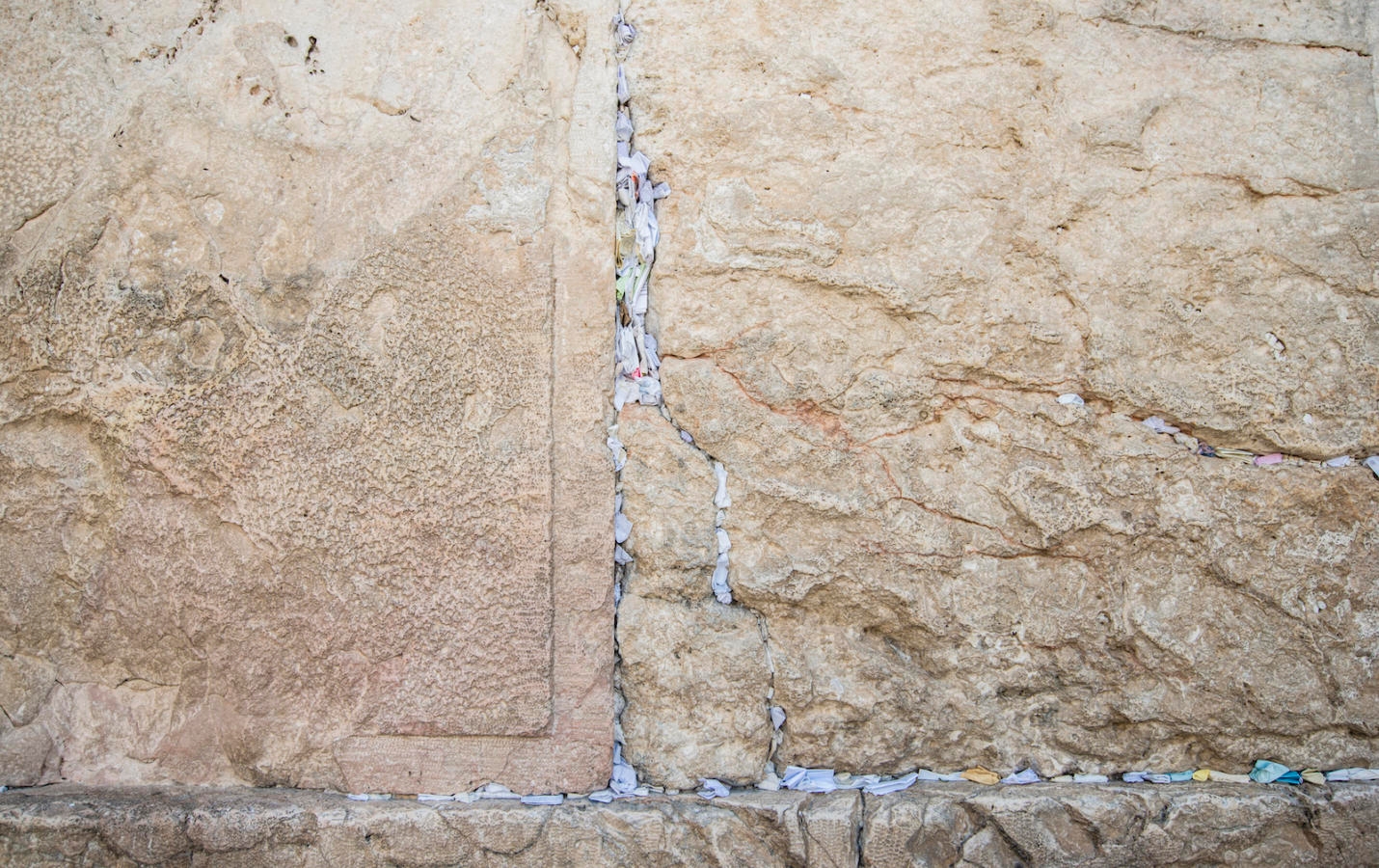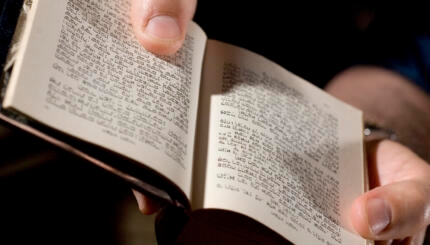In addition to the sacrificial rites there was a collateral form of worship, unofficial but fully recognized–private prayer. The Bible records private prayers by almost every important personality with whose life and activity it deals. The religious men and women turned to God in prayer, and their prayers, as recorded in the Bible, touch the heart and stir deep religious sentiments.
Solomon’s Prayer
In general, the personal prayers in the Bible–exclusive of the Psalms–are very much like the prayers that we would utter today. Solomon’s prayer at the dedication of the Jerusalem Temple may serve as an example. It contains all the elements of prayer-praise and thanksgiving, confession and intercession:
 “0 Lord, the God of Israel, there is no God like Thee, in heaven above, or on earth beneath; who keepest covenant and mercy with Thy servants, that walk before Thee with all their heart; … Behold, heaven and the heaven of heavens cannot contain Thee; how much less this house that I have builded! Yet have Thou respect unto the prayer of Thy servant, and to his supplication, 0 Lord my God, to hearken unto the cry and to the prayer which Thy servant prayeth before Thee this day; that Thine eyes may be open toward this house night and day…. And hearken Thou to the supplication of Thy servant, and of Thy people Israel, when they shall pray toward this place; yea, hear Thou in heaven Thy dwelling-place; and when Thou hearest, forgive” [I Kings 8:23, 27-30].
“0 Lord, the God of Israel, there is no God like Thee, in heaven above, or on earth beneath; who keepest covenant and mercy with Thy servants, that walk before Thee with all their heart; … Behold, heaven and the heaven of heavens cannot contain Thee; how much less this house that I have builded! Yet have Thou respect unto the prayer of Thy servant, and to his supplication, 0 Lord my God, to hearken unto the cry and to the prayer which Thy servant prayeth before Thee this day; that Thine eyes may be open toward this house night and day…. And hearken Thou to the supplication of Thy servant, and of Thy people Israel, when they shall pray toward this place; yea, hear Thou in heaven Thy dwelling-place; and when Thou hearest, forgive” [I Kings 8:23, 27-30].
Like all the prayers uttered by biblical personalities or ascribed to them, Solomon’s prayer is addressed directly to God. There are no priests or other intermediaries, nor does Solomon offer any sacrifices to win God’s favor. Solomon supplicates God with words that come from the heart, and his prayer is uttered in the utmost faith that if he is deserving his prayer will be heard and answered.
With your help, My Jewish Learning can provide endless opportunities for learning, connection and discovery.
Primitive Elements
To be sure, some biblical prayers contain primitive elements, such as prayers that are conditional in content. The suppliant formulates his prayer in the framework of a vow to do something which he assumes is pleasing to God if his prayer is answered. The classic example of this type of prayer is Jephthah’s vow before going to war against the Ammonites:
“If thou wilt indeed deliver the children of Ammon into my hand, then it shall be, that whatsoever cometh forth of the doors of my house to meet me, when I return in peace … shall be the Lord’s, and I will offer it up for a burnt-offering” [Judges 11:30-31].
The Bible also contains a number of prayers in which the suppliants argue with God and persuade Him by their logical arguments to alter His intent. God graciously yields to the logic of the prayer and changes His original decree. Abraham’s plea for Sodom and Gomorrah is the classic example. Abraham argues with the Almighty:
“Will You sweep away the innocent along with the guilty? What if there should be fifty innocent within the city; will You then wipe out the place and not forgive it for the sake of the innocent fifty who are in it? Far be it from You to do such a thing, to bring death upon the innocent as well as the guilty, so that innocent and guilty fare alike. Far be it from You! Shall not the Judge of all the earth deal justly?” [Gen. 18:23-25].
Unfortunately, Abraham’s logic was not backed by the facts of the situation, and his plea did not save the doomed cities.
These primitive elements in some of the biblical prayers, however, are the exceptions. Most biblical prayers are so sophisticated in their formulation that they have been adopted as patterns of prayer for all time. These prayers usually consist of two basic elements-introductory words praising God for His might and mercy, and a concluding petition, often universal in scope. King Solomon’s prayer, only part of which was quoted above, follows this pattern.
Prayers of Praise
Not all biblical prayers are petitionary. Many of them concentrate solely on praising God or thanking Him for His mercies and blessings. One such prayer is the Song of Moses which he and the Israelites sang after safely crossing the Sea of Reeds and escaping from the pursuing Egyptians:
“I will sing to the Lord, for He has triumphed gloriously;
Horse and driver He has hurled into the sea.
The Lord is my strength and might; He is become my salvation.
This is my God and I will enshrine Him;
The God of my father, and I will exalt Him”
[Exodus 15:1-2].
The ancient Hebrews found no contradiction between the two forms of worship: the sacrificial rites of the Temple and the informal words of prayer uttered by individuals. They coexisted without infringing upon each other. In those early times prayer was essentially a spontaneous “cry” to God for help. It was based on the intuitive feeling or the deep conviction that God gives ear to the supplications of the devout and answers the prayer that comes from the heart.
Temple Prayer
In connection with the Temple functions only one brief prayer is prescribed in the Bible.
When the farmer brought his first fruits to the Temple, he was to recite a formula in which he briefly summarized the story of the bondage in Egypt, the redemption, and the “land flowing with milk and honey” which God had given to the children of Israel.
To these formulated prayers one may add a number of blessings which achieved official usage and later found their way into the siddur [prayer book]. One of these is part of the blessing which Jacob bestowed on Joseph’s sons: “God make you like Ephraim and Manasseh” (Genesis 48:20), which is to this day the paternal blessing that the Jew bestows on his sons on Friday evenings. Another biblical blessing that has been repeated innumerable times is the blessing which the Kohanim pronounced in the Temple. It, too, has been incorporated into the synagogue worship:
“The Lord bless you, and keep you! The Lord deal kindly and graciously with you!; The Lord bestow His favor upon you and grant you peace!” [Num. 6:24-26].
During the period of the First Jewish Commonwealth prayer was generally spontaneous, free, and independent. Except for the brief formula recited by the farmers, the priestly blessing, and some of the Psalms, prayers occupied no place in the official worship of the Temple. The introduction of public prayer as a form of worship was, as we shall see, one of the great contributions of the Jewish people to world culture. But this took place during the Second Commonwealth.
Reprinted with permission from Jewish Worship, published by The Jewish Publication Society.



